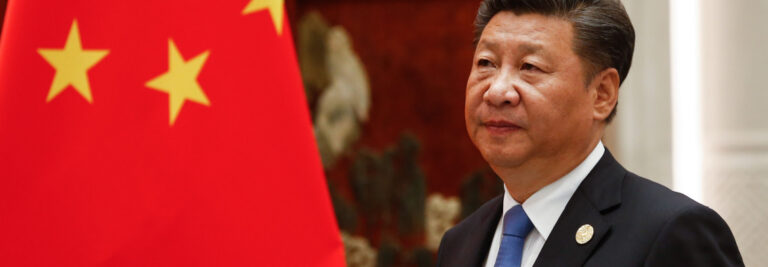Implications for Taiwan of White House OTMP Report on China’s Economic Aggression
On June 19, the White House Office of Trade & Manufacturing Policy (OTMP) released a scathing report, “How China’s Economic Aggression Threatens the Technologies and Intellectual Property of the United States and the World,” which shines a spotlight on how China’s policies threaten the economic and national security of the United States. The report, which specifically targets the People’s Republic of China’s (PRC) “Made in China 2025” (中國製造2025) initiative, highlights how China is seeking to acquire key technologies and intellectual property from other countries, including the United States, and capturing the emerging high-technology industries. While there was not a single direct reference to Taiwan in the US government report, the implications for Taiwan are significant.
According to Taiwan’s government data, total trade between Taiwan and China (including Hong Kong and Macau) reached US$181.8 billion in 2017, which accounts for 31.5 percent of the island’s total trade. By comparison, US trade with Taiwan totaled $67.1 billion in 2017. Moreover, around 40 percent of Taiwan’s total exports are bound for China and—according to some researchers—around 30 percent of China’s high-tech exports are actually derived from Taiwan-owned businesses. [1] As a result of Taiwan’s exposure and investments in the Chinese market, it is clear that any pending actions taken by the Trump administration against Chinese industries and exports could have collateral, albeit unintended, effects on Taiwan.
President Tsai Ing-wen acknowledged the possible severity of Taiwan’s bind as she recently convened a National Security Council (NSC) meeting with top government officials to discuss the potential impact of a widening “trade war” between the United States and China. Officials at the meeting reportedly assessed that the 25-percent tariffs levied by the Trump Administration on US$50 billion worth of Chinese goods, which will start on July 6, will not have a major impact on the Taiwanese economy and on Taiwanese investors in China. However, the situation may change if the sanctions escalate and Washington decides d to impose 10-percent tariffs on US$200 billion worth of Chinese imports.
Overexposure to the China market is not a new problem facing Taiwan’s leaders. While the Tsai administration appears to be particularly concerned by over-dependence on the Chinese market and is trying to rebalance Taiwan’s economic relationships through initiatives such as through the New Southbound Policy (新南向政策), Beijing is trying to draw Taiwan’s businesses and people ever closer in its embrace. Indeed, in February 2018, the PRC’s Central Government proposed 31 measures that serve as the baseline for a dollop of preferential treatments for Taiwan businesses and persons operating in China. The measures, which are now being implemented by different provinces and cities throughout the PRC, include an explicit effort to incorporate Taiwan’s businesses into the “Made in China 2025” initiative.
As the White House OTMP notes in its report: “the Chinese State seeks to access the crown jewels of American technology and intellectual property” and details five ways in which China is pursuing these ends. While not explicitly stated in the report, China is also attempting to acquire American technology through Taiwan intermediaries. This was clearly revealed in the tantalizing case of Micron Technology, in which a Taiwanese company and its employees have been accused of stealing American technology at the request of a Chinese company based in Fujian province. This is not an isolated case and perhaps no wonder why the first provision of the 31 measures states:
Apply the same policies for mainland [sic] enterprises to the companies that Taiwan compatriots invest in the mainland (hereinafter referred to as “Taiwan-funded enterprises”) participating in the “Made in China 2025” action plan. Support Taiwan businessmen to invest in the mainland to set up high-end manufacturing, smart manufacturing, and green manufacturing companies, and set up regional headquarters and R&D and design centers, and enjoy relevant taxation, investment, and other related support policies.
The broader context of the rethinking of the US-China economic relationships in Washington, DC also suggests other areas in which Taiwan’s interests may be at risks of being caught in the brewing trade war. According to a former Pentagon and National Security Council official, the debate over Committee on Foreign Investment in the United States (CFIUS) reforms for instance implies Taiwan’s interests:
So what implication does this [CIFUS reforms] have for Taiwan? … there is also a belief that Taiwan’s economic dependency with China—with many of its major companies with significant exposure in the People’s Republic of China (PRC)—could mean that Taiwanese investment in the United States may be considered a presumed proxy for the Chinese government.
Whether or not the United States and China take further steps towards a full-blown trade war, leaders in Taipei as well as in Washington should be mindful of the collateral costs. Taipei must take care of the concerns implicated in the OTMP report to ensure that its own high-tech sector does not become ensnarled in China’s industrial strategy and become collateral damages in the looming trade war between the United States and China. At the same time, the Trump administration should take measures that strengthens, not weakens, key partners’ ability to resist Chinese economic coercion. As the OMTP underscores, “economic coercion through export restraints on critical raw materials and monopsony purchasing power” is one of five ways in which China is acquiring technologies and intellectual property and capturing the industries of the future.
As the Center for New American Security (CNAS) stated in a recent report: “economic coercion is a global issue that cannot be addressed without adequate international information sharing and coordination … The Trump administration should also begin to identify trade policy tools and other tools that can be used to build the resilience of partners to resist Chinese economic coercion.”
The main point: The White House Office of Trade & Manufacturing Policy report on China’s economic aggression, which highlights Beijing’s use of economic coercion, has implications for Taiwan. As the Trump administration consider additional measures to counter these threats from China, it should consider measures that strengthens, not weakens, key partners’ ability to resist Chinese economic coercion.
Former Deputy Secretary General of Presidential Office Elected as Deputy Chairman of SEF
The Straits Exchange Foundation (SEF, 海峽交流基金會), a semi-official body established by the Taiwan government in 1991 to handle technical and business matters in cross-Strait relations, has elected a new deputy chairman. Yao Jen-to (姚人多, b. 1969), who previously served as the deputy secretary-general of the Presidential Office from 2016 up to his reassignment and was also briefly in the National Security Council, will serve concurrently as the SEF’s deputy chairman and secretary-general. Yao’s move follows a personnel reshuffle in February, as heads of government agencies in charge of the foreign policy, defense, and national security apparatuses were switched to optimize the Tsai administration’s policies.
Katherine Chang (張小月), the former chairperson of the Mainland Affairs Council (MAC)—a cabinet-level agency in charge of formulating and implementing the central government’s cross-Strait policy—served in that position from May 2016 to February 2018 and shifted over to become the new SEF chairperson in March. The new MAC chairman, Chen Ming-tong (陳明通), will reportedly be visiting Washington next month. The appointment of Yao as deputy chairman of SEF and the appointments of a couple new deputy chairman of MAC ostensibly completes the personnel changes for the Tsai administration’s new China policy team at the midterm of her administration.
The previous SEF chairman began his tenure in the immediate aftermath of the freeze in high-level cross-Strait dialogue. Tien Hung-mao (田弘茂) served as a former Foreign Minister between 2000 and 2002, and head of the SEF from September 2016 to March 2018. Despite repeated calls for dialogue to his counterpart, to include inviting Association for Relations Across the Taiwan Straits (ARATS, 海峽兩岸關係協會) President Chen Deming (陳德銘) for talks on Taiwan-administered island of Kinmen, there were no known contacts between the heads of SEF and ARATS under the Tsai administration.
Considered a confidante of Tsai Ing-wen, Yao is reportedly credited with getting Tsai to run for the chairmanship of the DPP after the party’s crushing defeat in the 2008 elections. The former assistant professor at National Tsinghua University, who served as special assistants to two former DPP chairpersons, invited criticism from his own party when he made a controversial comment in 2013 that suggested that Taiwan independence no longer represented the mainstream of Taiwanese politics. A controversy for which Yao’s fitness as the deputy chairman was called into question by some commentators in Taiwan labeling him insincere for failing to understand Taiwan’s history and social changes, and failing to understand “Taiwanese sorrow.”
Despite having been sidelined over the past two years because of Beijing’s refusal to engage in dialogue with the Tsai administration, SEF, as well as its counterpart ARATS, played a critical intermediary role in the early stages of cross-Strait negotiations when relations were arguably more sensitive. The first and longest serving president of ARATS, Wang Daohan (汪道涵), was in the position from 1991 until his death in 2005. Wang was ARATS’s lead negotiator in the first formal talks between the two sides in 1993 with SEF chairman Koo Chen-fu (辜振甫) in Singapore, and on another occasion in 1998.
As noted in a previous brief, by closing the door to existing channels of dialogue, Beijing is resetting the clock on cross-Strait relations. While Beijing may not want to engage Taipei through central government agencies, such as MAC and the State Council’s Taiwan Affairs Office, perhaps because of concerns that it would confer legitimacy to the Tsai administration, there should be no constraints to engage in dialogue through what are technically private organizations such as SEF and ARATS. With new teams in place at both SEF and ARATS, the time is ideal to reopen dialogue between the two sides. Indeed, it behooves the two sides of the Taiwan Strait to return to the spirit that led to the Koo-Wang talks in 1993 by creatively utilizing SEF and ARATS to engage in dialogue to prevent further deterioration in the situation.
The main point: With a new team in place at SEF and ARATS, the time is ideal to reopen dialogue between the two sides.
[1] Author’s conversation with economists from Taiwan in Washington, DC on June 14, 2018.





